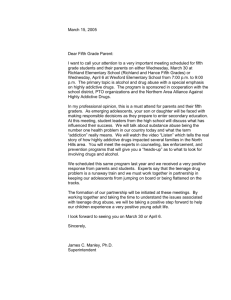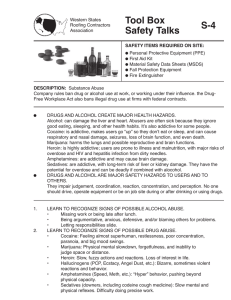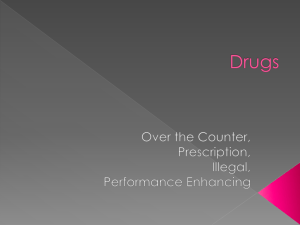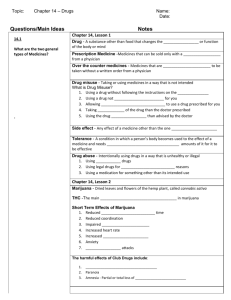P2070-1 Instruction Procedures Page 1 of 3
advertisement
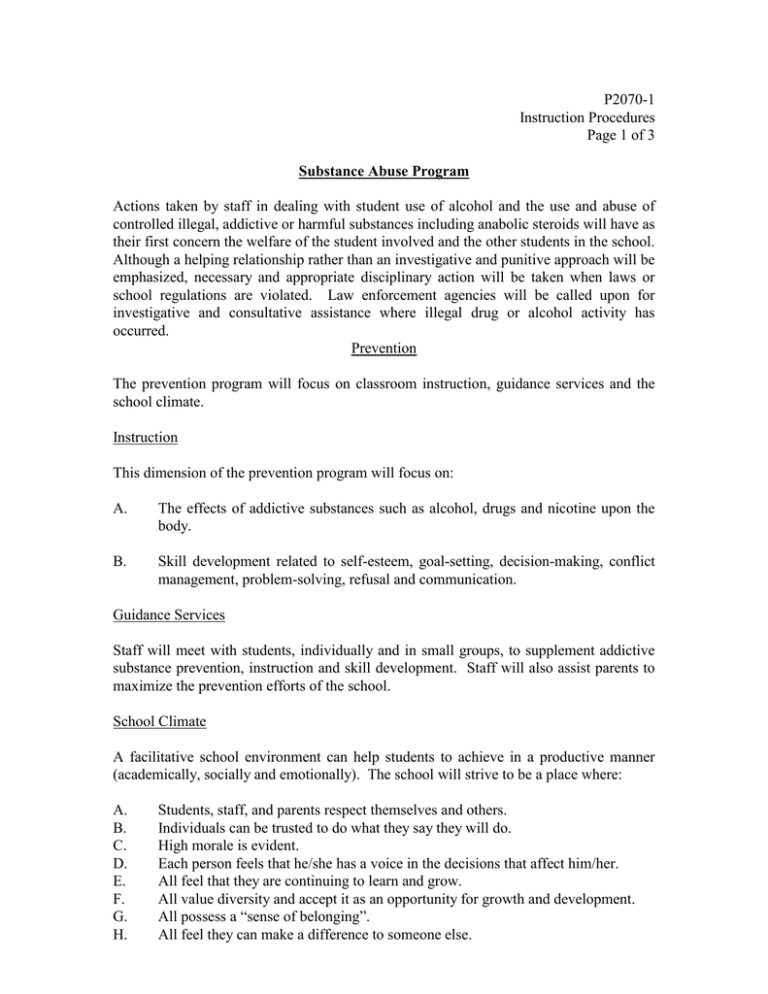
P2070-1 Instruction Procedures Page 1 of 3 Substance Abuse Program Actions taken by staff in dealing with student use of alcohol and the use and abuse of controlled illegal, addictive or harmful substances including anabolic steroids will have as their first concern the welfare of the student involved and the other students in the school. Although a helping relationship rather than an investigative and punitive approach will be emphasized, necessary and appropriate disciplinary action will be taken when laws or school regulations are violated. Law enforcement agencies will be called upon for investigative and consultative assistance where illegal drug or alcohol activity has occurred. Prevention The prevention program will focus on classroom instruction, guidance services and the school climate. Instruction This dimension of the prevention program will focus on: A. The effects of addictive substances such as alcohol, drugs and nicotine upon the body. B. Skill development related to self-esteem, goal-setting, decision-making, conflict management, problem-solving, refusal and communication. Guidance Services Staff will meet with students, individually and in small groups, to supplement addictive substance prevention, instruction and skill development. Staff will also assist parents to maximize the prevention efforts of the school. School Climate A facilitative school environment can help students to achieve in a productive manner (academically, socially and emotionally). The school will strive to be a place where: A. B. C. D. E. F. G. H. Students, staff, and parents respect themselves and others. Individuals can be trusted to do what they say they will do. High morale is evident. Each person feels that he/she has a voice in the decisions that affect him/her. All feel that they are continuing to learn and grow. All value diversity and accept it as an opportunity for growth and development. All possess a “sense of belonging”. All feel they can make a difference to someone else. P2070-1 Page 2 of 3 To this end, the school will encourage the formation of “natural helper”, Core Team and any education and/or prevention promotions that increase the awareness of the effects of substance abuse. Student support groups will assist students concerned about their own substance abuse, students living in families suffering from substance abuse, and students concerned about the substance abuse of someone else. Intervention The goal of the intervention program will be to eliminate use of alcohol and the use and abuse of controlled, illegal, addictive or harmful substances including anabolic steroids abuse by students. Ongoing in-service will be provided for faculty and staff. Important aspects of in-service training will include dimensions of the family illness and dynamics of the addiction process; enabling behaviors; intervention techniques; children in chemically dependent families; student experimentation, abuse and dependency; parental involvement and community resources; prevention issues and strategies; treatment and aftercare support; and implementation of the program into the classroom/building. Staff roles for the intervention program are as follows: A. Administrators, counselors, selected staff and nurse meet weekly for the purpose of identifying any student(s) who may be in need of assistance. Such staff will be sensitive to identifying symptoms of substance abuse. Suspected student(s) will be referred to the Core Team, consisting of staff members who have exhibited a strong interest in attending to the needs of such students and who have received specialized training in substance abuse dependency. B. The Core Team will meet regularly to review referrals; confer with students and, if warranted, counselors, administrators and/or parents; collect data; make recommendations for services; and maintain a confidential system of record keeping. Parents will be involved before any action is taken. C. Students returning to school from a community inpatient or outpatient treatment program will be given aftercare support by the Core Team. Such students will receive support from “natural helpers” so that they may develop a strong sense of bond with other students and the school. Primary aftercare responsibility for students returning from a community treatment program rests with the student, parent and community treatment program personnel. School staff, the student, parent(s) and community treatment personnel will work cooperatively to facilitate the aftercare plan. P2070-1 Page 3 of 3 Corrective Action If a student appears at school or at a school-sponsored function demonstrating behavior which indicates that he/she may be under the influence of an addictive substance and/or admits to an administrator that he/she is under the influence of an addictive substance, the school will take the following action: A. The parents will be notified to arrange for appropriate treatment. B. If the student’s illegal use of addictive substances is confirmed, the school administration may request the assistance of a law enforcement official in investigating the source of the addictive substance. C. Appropriate school disciplinary action will be taken. If school authorities find a student in possession of addictive substances at school, the addictive substances will be confiscated and turned over to law enforcement officials for investigation and disposal. Appropriate school disciplinary action will be taken by a school administrator regardless of law enforcement action. If a school administrator receives information concerning sales and use of addictive substances outside of school, the information will be reported to law enforcement officials for their investigation.
